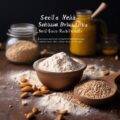The Sunny Delight of Sunflower Seed Butter: A Nutritious Spread for Everyone
In a world where nut allergies are increasingly common, sunflower seed butter shines as a beacon of hope and deliciousness. This creamy, nutrient-packed spread is not just an alternative; it’s a celebration of flavor and health in its own right. Let’s explore the wonderful world of sunflower seed butter and discover how this golden delight can brighten our meals and our lives.
What is Sunflower Seed Butter?
Sunflower seed butter is a smooth, spreadable paste made from roasted sunflower seeds. It’s similar in texture to peanut butter but has its own unique, slightly nutty flavor. This versatile spread is not only delicious but also packed with nutrients that can contribute to a healthy, balanced diet.
What makes sunflower seed butter truly special is its inclusivity. It’s free from the top 8 most common allergens, making it a safe and enjoyable option for those with nut allergies or sensitivities. It’s a spread that brings people together, allowing everyone to partake in the simple joy of a tasty, nutritious treat.
The Nutritional Sunshine of Sunflower Seed Butter
Sunflower seed butter is more than just a tasty spread – it’s a nutritional powerhouse. Here are some of the key nutrients you’ll find in this golden delight:
- Vitamin E: A powerful antioxidant that supports immune function and skin health.
- Magnesium: Essential for bone health, energy production, and muscle function.
- Protein: Vital for muscle repair and growth, and for keeping you feeling full and satisfied.
- Healthy Fats: Monounsaturated and polyunsaturated fats that support heart health.
- Fiber: Aids in digestion and helps maintain a healthy gut.
By incorporating sunflower seed butter into your diet, you’re not just treating your taste buds – you’re nourishing your body with a wealth of essential nutrients.
Spreading Joy: Creative Ways to Use Sunflower Seed Butter
The versatility of sunflower seed butter is truly remarkable. Here are some delightful ways to incorporate this sunny spread into your daily meals:
- Classic Sandwich: Spread it on whole grain bread for a nutritious twist on the classic PB&J.
- Smoothie Booster: Add a spoonful to your morning smoothie for extra creaminess and nutrition.
- Veggie Dip: Mix with a little honey and cinnamon for a tasty dip for apple slices or celery sticks.
- Baking Ingredient: Use it in cookies, muffins, or energy bars for a nutty flavor and protein boost.
- Oatmeal Topper: Swirl it into your morning oatmeal for a creamy, protein-rich breakfast.
The possibilities are endless! Let your creativity flow and discover new ways to enjoy this versatile spread.
Nurturing Compassion: The Ethical and Environmental Benefits
Choosing sunflower seed butter isn’t just good for our bodies; it can also be a compassionate choice for our planet and its inhabitants. Sunflower crops generally require less water than nut trees, making them a more sustainable option in water-scarce regions. Additionally, sunflower farming can support local economies and provide habitats for pollinators like bees and butterflies.
By opting for sunflower seed butter, we’re making a choice that aligns with values of sustainability and ecological mindfulness. It’s a small step, but one that can contribute to a larger movement towards more environmentally friendly food choices.
Embracing Inclusivity: Sunflower Seed Butter in Community Settings
One of the most beautiful aspects of sunflower seed butter is its ability to bring people together. In schools, workplaces, and community gatherings where nut allergies are a concern, sunflower seed butter offers a safe and delicious alternative that everyone can enjoy.
Imagine a school lunchroom where no child feels left out, or a potluck where everyone can partake in every dish without worry. Sunflower seed butter makes these inclusive scenarios possible, fostering a sense of community and shared enjoyment around food.
Frequently Asked Questions About Sunflower Seed Butter
1. Is sunflower seed butter healthier than peanut butter?
While both are nutritious, sunflower seed butter is higher in vitamin E and magnesium. It’s also a great option for those with nut allergies. The healthiest choice depends on individual dietary needs and preferences.
2. Can sunflower seed butter help with weight management?
Yes, it can. The protein and healthy fats in sunflower seed butter can help you feel full and satisfied, potentially reducing overall calorie intake. However, it’s calorie-dense, so moderation is key.
3. How long does sunflower seed butter last?
Unopened, it can last up to a year. Once opened, it’s best consumed within 3-6 months when stored in the refrigerator. Always check for any signs of spoilage before consuming.
4. Can I make sunflower seed butter at home?
Absolutely! Simply roast sunflower seeds and blend them in a food processor until smooth, adding a little oil if needed. Homemade versions allow you to control the ingredients and customize the flavor.
5. Is sunflower seed butter safe for people with seed allergies?
While it’s free from nut allergens, those with seed allergies should avoid sunflower seed butter. Always consult with a healthcare provider if you have concerns about food allergies.
Conclusion: Spreading Sunshine, One Spoonful at a Time
Sunflower seed butter is more than just a spread – it’s a symbol of inclusivity, a nutritional powerhouse, and a tasty addition to countless recipes. By choosing sunflower seed butter, we’re not just nourishing our bodies; we’re embracing a food that brings people together and supports sustainable practices.
So why not bring a little sunshine into your kitchen? Try incorporating sunflower seed butter into your meals and snacks. You might just find that this golden spread brightens not only your plate but also your day. Here’s to spreading joy, one spoonful of sunflower seed butter at a time!









